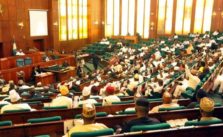The 10th National Assembly has been flooded with 32 bills seeking to establish new universities, polytechnics, and colleges of education in various parts of the country, according to the report.
This comes at a time when the Academic Staff Union of Universities, ASUU has cautioned the government against creating new institutions without adequate funding for the ones already in operation.
Nigeria currently has 52 federal universities, 63 state universities, and 147 private universities, as per the National Universities Commission, NUC. The National Board for Technical Education, NBTE also records 40 Federal Polytechnics, 49 state-owned and 76 private ones. There are 70 federal and state-owned colleges of health, while the number of private colleges of health is 17.
In addition, the National Commission for Colleges of Education, NCCE puts the number of colleges of education in Nigeria at 219.
Some of the bills proposed by the lawmakers include the establishment of the Federal University of Technology, Kaduna, sponsored by the Speaker of the House of Representatives; the Federal University of Medical and Health Sciences, Bende in Abia State, sponsored by the Deputy Speaker, Benjamin Kalu; the Federal University of Information and Communications Technology, Lagos Island; the Federal University of Agriculture, Ute Okpa in Delta State; the Federal University of Biomedical Sciences in Benue State; the Federal College of Health Sciences, Gaya; the Federal College of Dental Technology, Faggae; the Federal College of Agriculture, Agila, Benue State; the Federal College of Education, Dangi-Kanam, Plateau State; the Federal College of Education, Bende, Abia State; the Benjamin Kalu Federal Polytechnic, Rano, Kano State; and the Federal Polytechnic, Shendam, Plateau State, among others.
However, the Chairman of ASUU, Federal University of Minna, Prof. Gbolahan Bolarin, condemned the move by the lawmakers as misplaced priorities.
He said, “Misplaced priority. You have institutions that are trying to stay afloat yet the only thing you can think of is to create more institutions so that your people would think you are working. They should concentrate more on projects that would impact the lives of their constituents instead of creating more problems for the nation.”
The Programme Director, Reform Education Nigeria, Ayodamola Oluwatoyin, also expressed dismay over the development. He said, “It is so unfortunate that we live in a country where lawmakers use matters like education to score cheap political goals. This is unheard of in any part of the world. How will you propose bills for new institutions when the existing ones have been shut down? Who advises them,” Oluwatoyin said.
